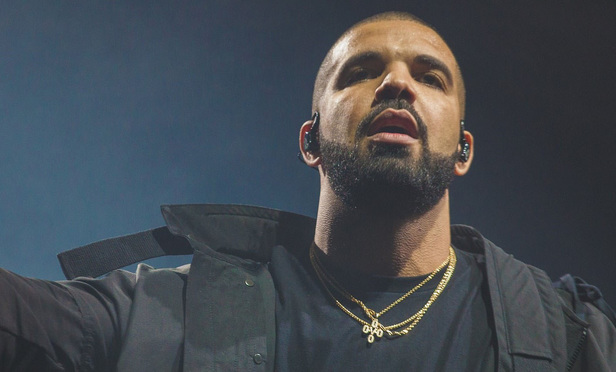 Drake at Summer Sixteen Tour 2016 in Toronto. (Photo: Wikimedia)
Drake at Summer Sixteen Tour 2016 in Toronto. (Photo: Wikimedia)
An ongoing legal fight over the massive profits generated by Drake took another turn Monday, as a young talent scout credited with discovering the hip-hop star filed suit in New York against Drake’s record label, Cash Money Records.
In an 18-page complaint lodged in Manhattan Supreme Court, James “Jas” Prince, the talent scout, and his father, J. Prince, the CEO of Rap-A-Lot Records, allege the “brazen and deliberate efforts of a record label and its unscrupulous principals to cheat plaintiff out of the consideration it was promised in return for furnishing the recording services of one of the most popular and financially successful artists in recent music history.”
The named plaintiff in the breach of contract suit, which seeks an accounting, declaratory judgment and unspecified damages, is Aspire Music Group. The small record label claims it entered into a 2009 contract with Cash Money Records mandating that it would receive one-third of the profits made from Drake recordings and a one-third ownership interest in the copyright to Drake’s first six albums.
Jas Prince and J. Prince had sued Aspire Music Group in 2012, claiming Aspire cut them out of a 22 percent interest they owned in the profits Aspire was due from Cash Money Records. Under a settlement, Jas and J. Prince gained the right to sue Cash Money Records in Aspire’s name, thereby leading to Monday’s suit.
Marc Kasowitz of Kasowitz Benson Torres in New York—who has represented President Donald Trump—is representing Aspire, along with his Los Angeles-based partner John Berlinski. Kasowitz’s firm declined to comment publicly on the case.
It was unclear Monday who was representing Cash Money Records, its affiliate Young Money Entertainment, and two named Cash Money principals.
The suit alleges that Drake signed an exclusive contract in 2008 with Aspire for his first six albums, and that he has since generated tens of millions of dollars in profits.
In 2009, the suit claims, Aspire transferred the rights to services by Drake to Cash Money Records in exchange for the one-third profits and one-third ownership in copyright, but has since only received “a few modest advances from Cash Money.”
The suit also claims that Cash Money has given Aspire scant accounting statements and eventually stopped providing them altogether of the profits it was owed. Prince claimed he was owed a 22 percent cut of Aspire’s alleged 33 percent from Cash Money.
“Compounding these breaches,” the lawsuit stated, “in January 2013 defendants induced Drake to break his exclusive artist agreement with plaintiff and sign a competing recording agreement with them, completely divesting plaintiff of its rights under the Aspire/YME agreement.”
Contact Jason Grant at [email protected]. On Twitter: @JasonBarrGrant




